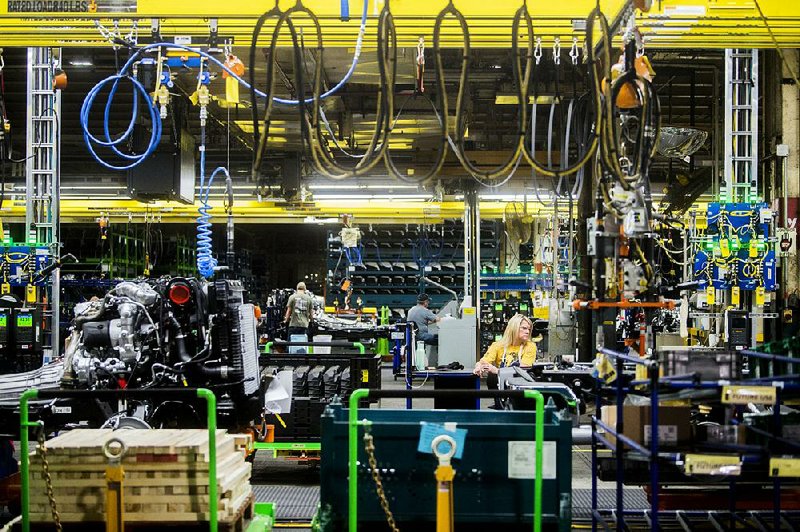WASHINGTON -- The U.S.-China trade war and slower global growth are weighing on the U.S. economy, reducing factory output in August for the first time in three years.
A survey by the Institute for Supply Management, an association of purchasing managers, on Tuesday showed that factory production and new orders fell sharply last month and showed signs of shrinking. U.S. manufacturers also cut jobs, the survey found. The data have fueled concerns that the broader U.S. economy is weakening.
Other recent data have shown factory output is decreasing in Europe and much of Asia, in large part because of the U.S.-China trade fight. That has weakened global demand for U.S. exports. Manufacturing activity is declining in 17 out of 30 countries surveyed by the consulting firm IHS Markit.
More than half of the public comments from companies surveyed by the institute pointed to the economic uncertainty as a drag on their businesses.
The institute's purchasing managers index fell to 49.1 in August, weaker than all forecasts in a Bloomberg survey of economists, data released Tuesday showed. Figures below 50 indicate the manufacturing economy is generally shrinking.
The group's gauge of new orders dropped to a more than seven-year low, while the production index hit the lowest since late 2015.
While consumer spending in the U.S. has remained strong, the deterioration in U.S. manufacturing could slow job growth and weaken the economy.
Investors were dismayed by the news. Stock prices, which had already fallen at the market's open, dropped further after the report's release. The Dow Jones industrial average slumped in afternoon trading, closing down 285 points, or 1.1%, in afternoon trading.
Along with the lower factory production figure, a measure of new orders also fell below 50, a sign that output will likely remain weak in the coming months.
"Another couple of months of declines on this scale would leave the U.S. facing an entirely unnecessary and self-inflicted recession," Ian Shepherdson, the chief economist at Pantheon Economics, wrote in a research note.
Yet that is not a foregone conclusion. A similar downturn in manufacturing in 2016 didn't pull the broader U.S. economy into recession.
A sharp drop in oil prices in 2015 and lower prices for many agricultural products caused oil drillers and farmers to cut back the next year on their investment in tractors, machinery and drilling rigs.
That, in turn, lowered output all along the manufacturing supply chain, from steel-makers to heavy equipment companies. Business spending plunged and economic growth fell to just 1.6% in 2016, barely half the 2.9% increase the year before.
Transportation equipment was one of seven industries in the survey to report shrinking business activity last month. Automakers, which report their August sales today, account for some of the slowdown. General Motors Co. has ceased production this year at a car plant in Ohio and two transmission factories, in Michigan and Maryland. Other automakers are reducing production shifts, including Nissan Motor Co., Fiat Chrysler Automobiles NV and Honda Motor Co.
Weakness in the automotive and electronics markets is also affecting 3M Co.'s bottom line. Sales and profit at the diversified manufacturer fell in the second quarter even as earnings topped expectations. At Caterpillar Inc., a slowdown in crude extraction from the Permian Basin, the largest U.S. oil patch, is reducing demand for machinery. What's more, the equipment-maker's worldwide machine sales in June and July were up 4%, the slowest in two years.
Similar dynamics are at play now: The trade war is discouraging businesses from investing in new equipment and expanding. Business spending fell in the April-June quarter for the first time since 2016.
But factory hiring is holding up better, so far. In May 2016, factories actually shed jobs over the preceding 12 months. But as of July, manufacturers had added more than 150,000 jobs in the previous year, though those gains are slowing.
President Donald Trump's fight with China, and his tariffs on steel and aluminum imports, are intended to help U.S. manufacturers but are now having the opposite effect.
The institute's report was issued against the backdrop of a new round of tariffs on Chinese goods, which began Sunday. Those tariffs are targeted at consumer goods and will likely raise prices for American consumers. They also point to a trade war that shows little sign of stopping.
Surveys of purchasing managers this week have suggested that the uncertainty generated by the trade war has had a global impact.
Its China survey showed mixed results, as domestic activity -- bolstered by government spending in infrastructure -- overshadowed the drop in an index measuring export orders.
Information for this article was contributed by Bani Sapra and Christopher Rugaber of The Associated Press and by Reade Pickert of Bloomberg News.
Business on 09/04/2019
